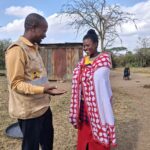
By Ruth Keah – rkeahkadide@gmail.com
Moimuna Aboud stands poised in her diving gear, prepared to embark on a remarkable underwater journey.
For two years, the dedicated member of the Wasini Beach Management Unit (BMU) in Shimoni, Kwale County, epitomises the spirit of a health promoter determined to enlighten her community about the importance of preserving the delicate dry land and vibrant ocean ecosystems.
With her eyes set on exploring the restored coral reefs at Shimoni, Maimuna’s passion for environmental education radiates, promising a captivating adventure that also inspires others to safeguard nature’s wonders.
Unlike many members of the BMUs and boat operators who are the main ocean stakeholders in Shimoni seascape, Maimuna was initially unaware of coral reef restoration efforts and the diverse array of coral species that inhabit the ocean. Thanks to REEFolution Trust, a not-for profit conservation organisation that restores coral reefs and shares research insights in Shimoni, Kwale County, she now has what it takes to make biodiversity thrive.
According to Secore.org (2021), detrimental effects of global warming and human activities have resulted in the loss of more than 50 per cent of the world’s coral reefs in the past three decades. Furthermore, it is predicted that without intervention within the next century, up to 90 per cent of the remaining coral reefs may perish, leaving only a few pristine ones untouched by the destructive forces.
In response to alarming decline of coral reefs, managers, practitioners, scientists and conservation organisations have come up with innovative restoration techniques that also aim to accelerate recovery of damaged reefs.
REEFolution, Pilli Pipa Dhow Safaris and the local community working with Mkwiro Beach Management Unit have restored 3ha of coral reefs in the Mkwiro Community Managed Area within the Wasini Channel and trained 15 REEF rangers. More than 2,000 artificial reef structures have been placed, with nurseries producing over 10,000 young coral fragments annually.
Joshua Wambugu is a social science PhD researcher who focuses on the societal impact of coral reef restoration. He says unlike tree planting which has been a long-standing practice understood by many, coral reef restoration is a relatively new trial and poses unique challenges which is creating a small conflict and dilemma among locals.
In order to foster understanding and encourage active participation in coral reef restoration, REEFolution through Reef Stewardship Project, a small grant funded by Rufford Foundation is now raising awareness and educating Shimoni residents about the significance of coral reef restoration, how it is done and various techniques involved. This is done through experiential learning (training) where locals drawn from BMUs and boat operators participate.
The primary objective of the project is to emphasise the importance of preserving and rehabilitating coral reefs, while using various types of artificial reef structure.

session of boat operators and members of BMUs on how to restore coral reefs in Kwale County, Kenya’s coast – Photo Credit | Ruth Keah
“The local community’s understanding of coral reef restoration is limited as they continue to hold onto traditional conservation knowledge. Our goal is to bridge this gap by raising awareness about the latest advancements in marine ecosystem rehabilitation and introducing them to the emerging modern interventions,” said Mr Wambugu.
Not only has REEFolution, through the Reef stewardship project helped Maimuna to rekindle the intricacies of diving and snorkeling but it also opened her eyes to the mesmerising world of corals and the delicate process of their restoration. With new-found knowledge and burning passion, Maimuna is making her dream of exploring the ocean and actively participating in conservation efforts a reality.
“After training, I gained a profound understanding of the invaluable benefits coral reefs and other coral species provide. I was shocked to see a lot of fish in the areas where corals have been restored. The vibrant corals provided a haven for countless marine species, attracting colourful fish that danced in harmony. I’m inspired. I urge the centre to extend this opportunity to other women, to empower us to become passionate advocates of coral reef restoration,” she said.
Implementation of the Reef Stewardship project
Besides his role as a social science PhD researcher, Wambugu is the project lead for the Reef Stewardship project that is implemented using a significant experiential learning approach.
This crucial approach allows active engagement of locals through hands-on participation in various reef restoration activities from the REEFolution on-land restoration sites.
“We involve members from BMUs in Mkwiro, Wasini Shimoni and Kibuyuni as well as Wasini youth boat operators and Kisite community boat operators because the local community is a vital stakeholder that relies on the ocean for livelihood. By actively participating in our initiatives, they gain a firsthand perspective that strengthens their connection and motivates them to embrace our efforts,” he said.
“We are undertaking these efforts with the aim of restoring the glory of coral reefs within the Wasini channel” he added.
Suleiman Rai, a tour guide and dedicated member of the Wasini Youth Boat Operators team with nearly 15 years’ experience says he now has deep understanding of the ocean and its delicate ecosystem. He says throughout his career, he has witnessed consequences of poor boat anchoring practices which have damaged precious coral reefs.
Rai says despite his awareness of REEFolution’s existence he had never personally witnessed their restoration efforts on land and in the ocean. “I urge fellow beach operators to embrace the new technology for restoring coral reefs. By actively participating in coral reef restoration, we can create a thriving breeding ground for fish and an enchanting tourist attraction,” he said.
Mercy Zawadi, an assistant for the Reef Stewardship Project says boat operators will have opportunity to enroll in specialised short courses designed to enhance their skills and promote responsible tourism practices.
“We have trained 60 boat operators and members of the BMUs. The response has been good and the participants now recognise the time it takes for corals to mature and as a result, are eager to actively participate in restoration efforts within their protected areas. Furthermore, we have received interest from others keen to join REEFolution and contribute to our mission,” she said.








